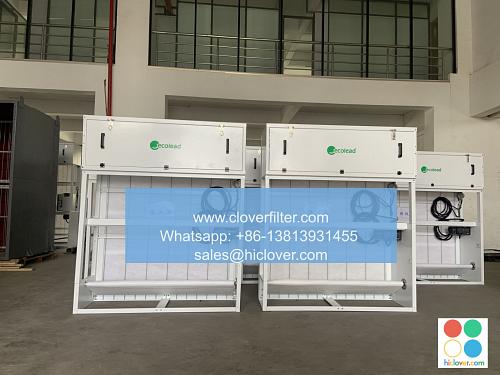Controlling Airborne Contaminants with Automatic Roll Air Filters in Montreal Medical Device Manufacturing

In Montreal’s medical device manufacturing industry, maintaining a contamination-free environment is crucial to ensure the quality and safety of products. One of the most effective ways to control airborne contaminants is by using automatic roll air filters. These advanced filtration systems are designed to capture particles and microorganisms, providing a clean and sterile environment for manufacturing medical devices.
Medical device manufacturing involves the production of a wide range of products, from surgical instruments to implantable devices. These products must meet stringent quality and safety standards, and even minor contamination can compromise their integrity. Airborne contaminants, such as dust, bacteria, and viruses, can easily spread through the air and settle on surfaces, making it essential to implement effective control measures.
Automatic roll air filters are a popular choice for controlling airborne contaminants in medical device manufacturing facilities. These systems consist of a roll of filter media that is automatically advanced as it becomes saturated with particles and contaminants. The used filter media is then discarded, and a new section is exposed, ensuring continuous filtration and minimizing maintenance downtime.
The benefits of using automatic roll air filters in medical device manufacturing are numerous. Firstly, they provide high-efficiency filtration, capturing up to 99.97% of particles as small as 0.3 microns. This includes bacteria, viruses, and other microorganisms that can compromise product quality and safety. Secondly, they are highly effective in reducing airborne contamination, minimizing the risk of product recalls and regulatory non-compliance.
Another advantage of automatic roll air filters is their ability to operate continuously, without the need for manual intervention. This ensures that the air is constantly being purified, even during periods of high production or when personnel are not present. Additionally, these systems are designed to be compact and space-efficient, making them ideal for use in smaller manufacturing facilities or areas with limited space.
In Montreal’s medical device manufacturing industry, automatic roll air filters are used in a variety of applications, including cleanrooms, operating rooms, and production areas. They are also used in conjunction with other control measures, such as HEPA filters and laminar flow systems, to provide a comprehensive contamination control strategy.
The use of automatic roll air filters in medical device manufacturing is also supported by regulatory guidelines and industry standards. For example, the International Organization for Standardization (ISO) 14644-1 standard for cleanrooms recommends the use of high-efficiency filtration systems, such as automatic roll air filters, to control airborne contamination.
In addition to their technical benefits, automatic roll air filters also offer economic advantages. By reducing the risk of product contamination and recalls, manufacturers can minimize costly rework and waste. Additionally, these systems can help to reduce energy consumption and extend the life of equipment, resulting in lower operating costs and improved overall efficiency.
Conclusion:
In conclusion, automatic roll air filters are a highly effective solution for controlling airborne contaminants in Montreal’s medical device manufacturing industry. Their high-efficiency filtration, continuous operation, and compact design make them an ideal choice for use in cleanrooms, operating rooms, and production areas. By implementing these systems, manufacturers can ensure a contamination-free environment, minimize the risk of product recalls, and improve overall efficiency and productivity.
FAQs:
Q: What is the typical lifespan of an automatic roll air filter?
A: The typical lifespan of an automatic roll air filter varies depending on the application and usage, but can range from 1-6 months.
Q: Can automatic roll air filters be used in conjunction with other control measures?
A: Yes, automatic roll air filters can be used in conjunction with other control measures, such as HEPA filters and laminar flow systems, to provide a comprehensive contamination control strategy.
Q: Are automatic roll air filters suitable for use in small manufacturing facilities?
A: Yes, automatic roll air filters are designed to be compact and space-efficient, making them ideal for use in smaller manufacturing facilities or areas with limited space.
Q: Do automatic roll air filters require regular maintenance?
A: Automatic roll air filters are designed to operate continuously with minimal maintenance, but may require occasional replacement of the filter media and cleaning of the system.
Q: Can automatic roll air filters be customized to meet specific application requirements?
A: Yes, automatic roll air filters can be customized to meet specific application requirements, including varying filter efficiencies, sizes, and materials.

